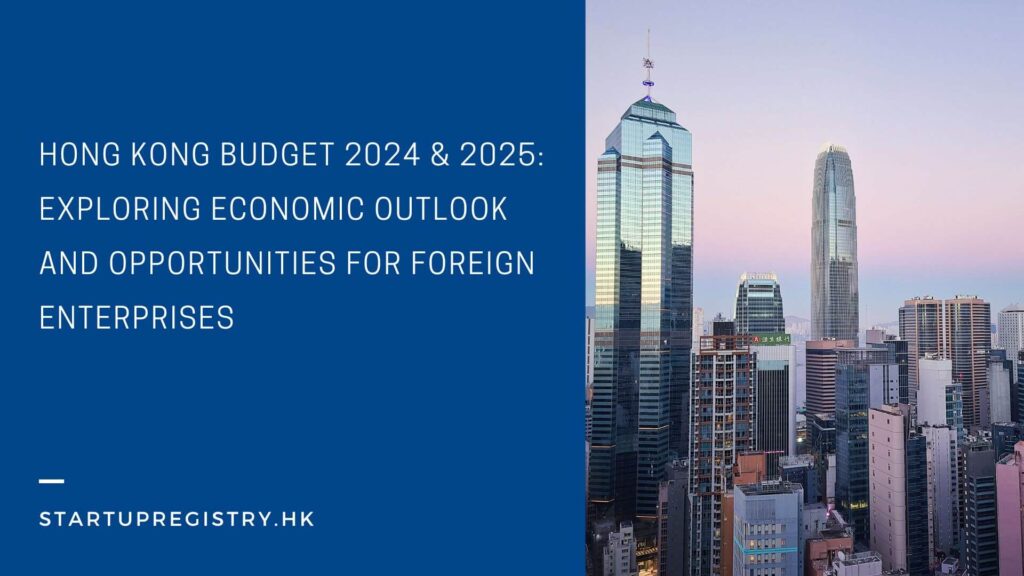The last two years have not been so good in terms of the global economy, but this year is estimated to show better results than the previous two years. The International Monetary Fund forecasted that the worldwide growth rate in 2024 will be around 3.1%. Although it is less than the average growth rate between 2000 and 2019, which was 3.8%, it is still better than the global growth rate of 2023, which was only 2.7%.
To contribute to global economic growth and strengthen the position of Hong Kong at the worldwide level, the Hong Kong government recently unveiled its 2024 and 2025 budget. This budget provides valuable insights into the economic landscape of Hong Kong and contains several initiatives to attract foreign enterprises.
Foreign enterprises can enjoy many benefits from Hong Kong’s 2024 and 2025 budget. This blog post aims to discuss the key elements of the budget, focusing on the projected economic growth and the policies intended to entice foreign businesses to establish operations in Hong Kong. In this blog post, we will be discussing the financial forecast of Hong Kong and the policies in the budget that intend to attract foreign enterprises. If you want to learn about these policies and their benefits in detail, you must read this article until the end.

Hong Kong Economic Forecast
The Hong Kong government projects that the real-term growth of the Hong Kong economy in 2024 will be between 2.5 to 3.5 percent. It has been expected that domestic cost pressure will increase alongside economic recovery. However, external price pressure is expected to ease, though persisting geopolitical tensions may pose upside risks. According to the forecast of the Hong Kong government, the underlying inflation rate is expected to be 1.7 percent, with a headline inflation rate of 2.4 percent in the year 2024. Hong Kong’s focus on encouraging high-quality development will allow it ample room to grow.
Policies to Attract Foreign Enterprises
The budget issued by the Hong Kong government for the financial year 2024 and 2025 offers a multitude of policies for foreign enterprises. These policies can prove to be extremely effective in attracting foreign enterprises and can help Hong Kong boost its economy. The details of these policies are mentioned below.
1. Attracting Enterprises, Capital, and Talent on All Fronts
The Office for Attracting Strategic Enterprises (OASES), along with other relevant entities seeks to assist high-value-added technology industries and enterprises from the Mainland and overseas in establishing a foothold in Hong Kong. 10-plus enterprises have agreed to either set up their businesses or expand their businesses in Hong Kong and have signed a partnership agreement with the OASES.
The Hong Kong Investment Corporation Limited will channel the capital and leverage market resources to attract more I&T companies to establish their businesses in Hong Kong and accelerate the development of strategic industries.
2. Support for Small and Medium Enterprises
The Hong Kong government is offering various schemes for small and medium enterprises. Under the SME Financing Guarantee Scheme, the government will extend the application period for the 80% and 90% Guarantee Products for two years to the end of March 2026.
Under the Digital Transformation Support Pilot Programme, SMEs in the food and beverage industry and retail industries can select suitable options among ready‑to‑use basic digital solutions and apply for subsidies on a matching basis early this year. The government has proposed introducing two enhancement measures to deduct expenses under profits tax.
3. Opening Up New Capital Sources – Middle East
The Hong Kong budget 2024/25 has also focused on opening up new capital sources in the Middle East. Last year, the first Exchange Traded Fund (ETF) of the Asia-Pacific region, which tracks stocks in Saudi Arabia, was listed in Hong Kong. This has been a milestone in enhanced mutual access between the two markets.
The Hong Kong Monetary Authority (HKMA) is working with several financial institutions to list an Exchange Traded Fund (ETF) in the Middle East that tracks Hong Kong stock indices. This will assist Hong Kong in strengthening the trade between the two markets and create better opportunities for attracting foreign enterprises.
4. Pooling Talent
The Hong Kong government has launched many schemes, including the Top Talent Pass Scheme (TTPS), to attract talent from Mainland and overseas. A large pool of talent provides a wide range of opportunities for growth and success. Under various talent admission schemes, over 140,000 applications were approved last year, and about 100,000 have already reached Hong Kong.
The Hong Kong Talent Engage (HKTE) has taken several measures to attract a talent pool from the Mainland and overseas and provides them with a one-stop support service that can help them settle in Hong Kong.
5. Property Transaction Incentives
The Hong Kong government has listed various property transaction incentives in its 2024/25 budget. According to the new budget, the Hong Kong government has canceled all demand-side management measures for residential properties. This means No Special Stamp Duty, Buyer Stamp Duty, or New Residential Stamp Duty needs to be paid for any residential property transactions. Moreover, stamp duties that needed to be paid on the transfer of real estate investment trust (REIT) units and the jobbing business of option market-makers will be waived. This is being done to enhance the competitiveness in the market.
6. Boosting Stock Market Efficiency
The Securities and Futures Commission of Hong Kong (SFC) and the HKEX are planning a list of measures that can assist in boosting the efficiency and liquidity of the stock market in Hong Kong. They are planning to enhance the listing regime, improve the transaction mechanism, boost investor services, and step up market promotion. Enhancements in listing requirements and arrangements for structured products will be made while the cost of listing the products will be reduced. They are planning on refining real-time market data services to facilitate investors with services at a reasonable price. Another essential thing that they are considering is strengthening connectivity with the Middle East and ASIAN countries so that they can attract more capital and issuers.
7. International Trade Centre
In the past few years, Hong Kong has experienced a rise in exports to developing countries such as those in ASIAN and the Middle East. Hong Kong is aiming to develop itself as a multinational supply chain management center. Hong Kong has taken various initiatives to expand its reach and trade network. This has allowed businesses in Hong Kong to explore emerging markets and has helped foreign enterprises to enter Hong Kong.
The Hong Kong government is planning to establish an Economic and Trade Office (ETO) in Riyadh, Saudi Arabia. The Belt and Road Initiative is actively contributing towards green development, innovation, and technology. A Belt and Road festival is also going to be initiated to promote collaborations with B&R countries in areas of talent exchange, technology, art and culture, and investment.
8. International Financial Centre
Hong Kong is fast pacing towards becoming an international financial center. The schemes and initiatives launched by the Hong Kong government have helped Hong Kong attract global investment and foreign enterprises. Hong Kong has the world’s largest offshore RMB liquidity pool, over RMB 1 trillion. Hong Kong is the world’s largest offshore RMB business hub, holding about 75 percent of global offshore RMB settlement. Applications for the new Capital Investment Entrant Scheme (new CIES) will be out soon. Investors eligible to invest HK$27 million or more in qualifying assets and place HK$3 million into a new CIES Investment Portfolio may apply to reside in Hong Kong and pursue development here.
9. International Innovation and Technology Centre
The innovation and technology industry has played a vital role in shaping the economy of Hong Kong and is a huge contributor to stabilizing the economy of Hong Kong. The Hong Kong government has shown keen interest in promoting technologies such as Artificial Intelligence, Life and Health technology, fintech, e-commerce, and many more. The new budget includes the New Industrialisation Acceleration Scheme (NIAS), which states that businesses related to the field of life and health technology, AI and data science, advanced manufacturing, and new energy technology will be provided with support of up to $200 million. Applicant enterprises are required to invest at least a sum of $200 million in Hong Kong. These initiatives can be extremely helpful in achieving the goal of making Hong Kong an international innovation and technology center.
Ready to Set Up Your Business in Hong Kong?
The Hong Kong Budget 2024 and 2025 offers a multitude of opportunities for foreign enterprises. It allows them to establish a business in Hong Kong or expand their business here. The new budget has various policies focused on the development of Hong Kong and attracting foreign enterprises. Some of the most beneficial policies that are aimed at attracting foreign enterprises are contained in attracting enterprises, capital, and talent on all fronts, support for small and medium enterprises, opening up new capital sources – Middle East, pooling talent, property transaction incentives, boosting stock market efficiency, international trade center, international financial center, and international innovation and technology center.
If you are ready to set up a business in Hong Kong, you should collaborate with us to smoothen your journey in Hong Kong. We at Startupr can help you with the tedious administrative work and provide you with several services that can help you in running your business in Hong Kong. Our services include company incorporation, obtaining Hong Kong office address, annual return form filing, mail forwarding, bookkeeping & accounting, and many more.


